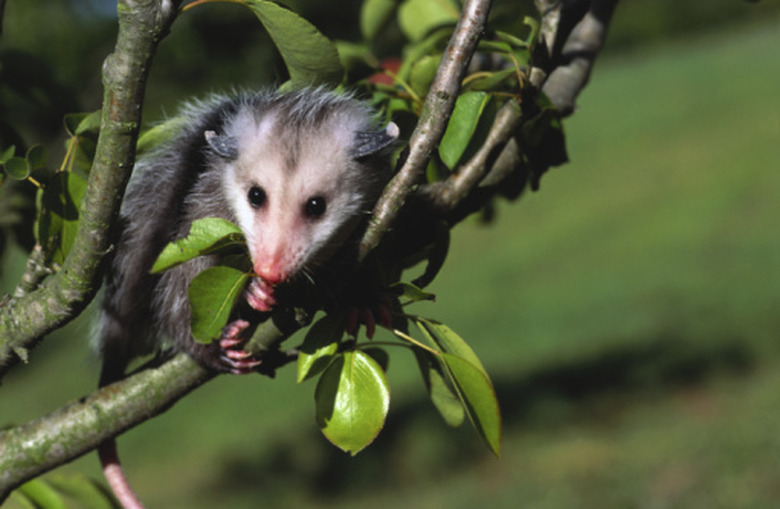How Would I Know If A Possum Lives In My Wall?
We may receive a commission on purchases made from links.
The remarkably adaptable and very unusual opossum is also known simply as possum and is the only native North American marsupial. Common across the United States, this mammal is famed far and wide for playing dead when it's frightened. While not dangerous, possums definitely can pose a nuisance in residential areas where they may homestead under your porch. They may also manage to set up housekeeping in places you would rather they didn't, such as your attic, crawlspace, or even within the walls of your house.
Tip
If you notice a strong, unusual odor; possum feces; and shuffling or scraping sounds in your walls during the day, it's likely that an opossum has taken up residence there.
There's a Possum Here
There's a Possum Here
Reading animal signs includes finding and identifying tracks, trails, excrement, and feeding areas. Each animal leaves behind a unique sign that tells you what species you are dealing with. Possums, which are omnivores, are somewhat clumsy and messy when feeding. Like raccoons and bears, they will feed from the most available source, be that your trash can, vegetable garden, or compost pile.
Possums have a special fondness for pet food that's left out overnight. Look for tracks; possum tracks show long "fingers" and end with claw indentations. The rear paw is larger than the fore paw, and shows a "thumb" that extends toward the rear inside of the print.
Possums Leave Poo
Possums Leave Poo
This is the surest way to tell if the noises in your wall are being made by a possum. Possum poop is much like dog feces. The excrement is about 3/4 of an inch thick and smooth on the sides with a taper at the ends. They are dark brown to black, and may mold with age. Many times they are curved. Possum poop is most commonly found in areas with shelter on at least two sides, and if found out in the yard will likely be on a bed of leaves or other debris.
Noise and Odor
Noise and Odor
Possums are noisy house guests, but since they are nocturnal and leave their den to feed at night, noise will cease after dark and likely start up again as they return at dawn. The level of noise also depends on the number of possums in residence. Unlike rats, often accompanied by chewing sounds, opossums make shuffling and scraping sounds as they move about in the walls.
Possums possess a very strong odor. The presence of an unusual and foul odor in your home may point to there being a possum living in your walls. Their urine smells strong and often leaves stains behind.
Elimination of Possums
Elimination of Possums
If you suspect you have a possum in residence, it is best to hire a professional to deal with it. Possums have very sharp teeth and carry a number of pathogens like leptospirosis and salmonella. They are not, however, considered a rabies-vector species. Although any mammal can carry rabies, possums have a low body temperature which makes their blood inhospitable to the rabies virus. They are unpredictable when cornered.
If you are confident in your abilities and have a wildlife rehabilitation expert to coach you, you can attempt to trap a possum in a live trap; contact your local animal control office for guidance and details concerning legality. Be sure to find and seal the entry point where the possum or possums originally gained access to the wall.
